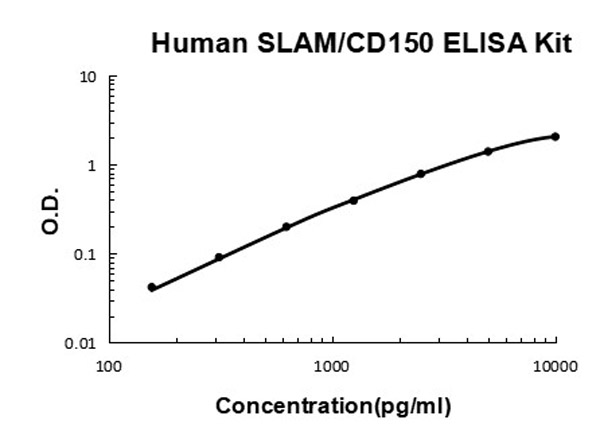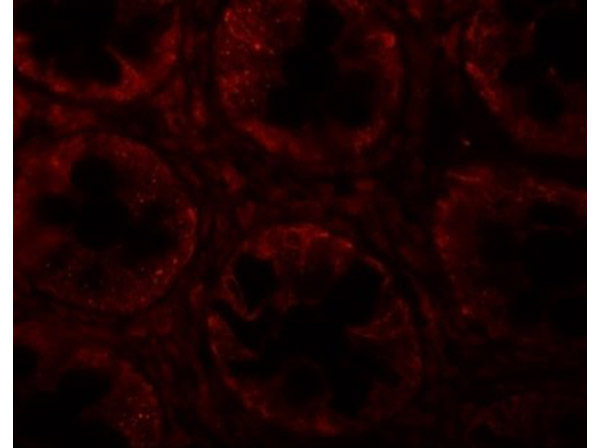Human SLAM - CD150 ELISA Kit
KOA0793
1 Kit
ELISA
Human
156 pg/ml - 10,000 pg/ml
Shipping info:
$50.00 to US & $70.00 to Canada for most products. Final costs are calculated at checkout.
Product Details
Human SLAM/CD150 AccuSignal ELISA Kit - KOA0793
CD 150, Cd150, CD150 antigen, Cdw150, Estm51, Ipo 3, IPO-3, Ipo3, Signaling lymphocytic activation molecule, Signaling lymphocytic activation molecule family member 1, Signaling lymphocytic activation molecule family member 1 isoform CRA_a, Signaling lymphocytic activation molecule family member 1 isoform CRA_b, Signaling lymphocytic activation molecule precursor, Slaf1, SLAF1_HUMAN, SLAM family member 1, Slamf 1, Slamf1, SLAMF1 protein
ELISA Kit
156 pg/ml - 10,000 pg/ml
Target Details
SLAMF1 - View All SLAMF1 Products
Human
Expression system for standard: NSO; Immunogen sequence: A21-K236
Natural and recombinant human SLAM. There is no detectable cross-reactivity with other relevant proteins.
Q13291 - UniProtKB
NP_003028.1 - NCBI Protein
Application Details
ELISA
Useful in Sandwich ELISA for Quantitative Detection of Antigen. Aliquot 0.1ml per well of the 10,000pg/ml, 5000pg/ml, 2500pg/ml, 1250pg/ml, 625pg/ml, 312pg/ml, 156pg/ml human SLAM standard solutions into the precoated 96-well plate. Add 0.1ml of the sample diluent buffer into the control well (Zero well). Add 0.1ml of each properly diluted sample of human cell culture supernates, serum or plasma(heparin, EDTA) to each empty well. It is recommended that each human SLAM standard solution and each sample be measured in duplicate.
Formulation
Heparin Sodium
Shipping & Handling
Wet Ice
Store vials at 4°C prior to opening. Centrifuge product if not completely clear after standing at room temperature. This product is stable for 6 months at 4°C as an undiluted liquid. Dilute only prior to immediate use. For extended storage freeze at -20°C or below for 12 months. Avoid cycles of freezing and thawing.
See kit insert for complete instructions.
Signaling lymphocytic activation molecule is a protein that in humans is encoded by the SLAMF1 gene. It belongs to the immunoglobulin gene superfamily. This gene is mapped to 1q23.3. It has found that SLAM is constitutively expressed on peripheral blood memory T cells, T-cell clones, immature thymocytes and a proportion of B cells, and is rapidly induced on naive T cells after activation. In MV-resistant cell lines, infection with clinical MV and expression of SLAM, but not CD46, caused cytopathic effects (CPE). The expression of SLAM on activated B and T lymphocytes correlates with the pathology of MV infection in humans and monkeys, in which lymphoid organs are the chief sites of MV replication and the binding of MV to SLAM may impair the signaling functions of SLAM in lymphocyte activation and inhibit Th0/Th1 cytokine production, thereby promoting Th2 cytokine production. It has reported that antibody-mediated ligation of SLAM on thymocytes triggered a protein tyrosine phosphorylation signal in T cells in a SAP-dependent manner. This signal also involved SHIP, the adaptor molecules DOK2, DOK1, and SHC and RASGAP.
This product is for research use only and is not intended for therapeutic or diagnostic applications. Please contact a technical service representative for more information. All products of animal origin manufactured by Rockland Immunochemicals are derived from starting materials of North American origin. Collection was performed in United States Department of Agriculture (USDA) inspected facilities and all materials have been inspected and certified to be free of disease and suitable for exportation. All properties listed are typical characteristics and are not specifications. All suggestions and data are offered in good faith but without guarantee as conditions and methods of use of our products are beyond our control. All claims must be made within 30 days following the date of delivery. The prospective user must determine the suitability of our materials before adopting them on a commercial scale. Suggested uses of our products are not recommendations to use our products in violation of any patent or as a license under any patent of Rockland Immunochemicals, Inc. If you require a commercial license to use this material and do not have one, then return this material, unopened to: Rockland Inc., P.O. BOX 5199, Limerick, Pennsylvania, USA.


